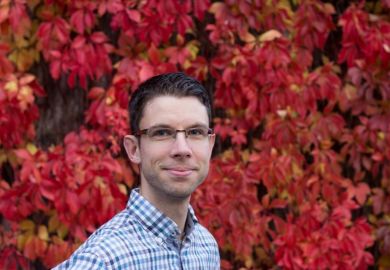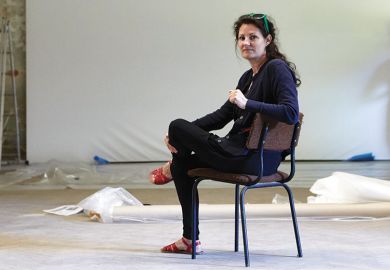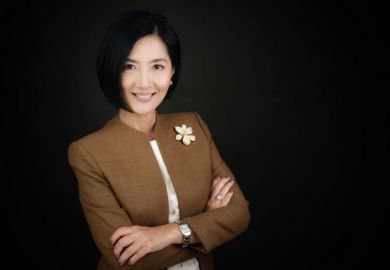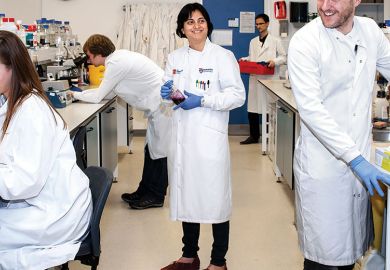Richard Kingsford is a river ecologist at UNSW Sydney, where he directs the Centre for Ecosystem Science. For 33 years he has conducted month-long aerial surveys of waterbirds over a 2.7 million square kilometre expanse of eastern Australia, an area as big as Kazakhstan. Last month, he co-published a study warning that dams, feral animals and climate change were pushing Australia’s platypus to the brink of extinction.
Where and when were you born, and how has it shaped who you are?
In 1958 in Nakuru, Kenya. We were farmers. I had a keen birdwatching grandmother who inculcated an appreciation of birds and wildlife in me. Kenya has very colourful species like sunbirds and bee-eaters. When I was 12 my parents emigrated to New South Wales. I was unimpressed with the birds here – apart from parrots; I thought they were cool. I now really appreciate Australian birds.
How did you gain an appreciation of rivers?
I didn’t think a lot more about them other than as good places to swim or good places to avoid – particularly where there were crocodiles and hippos. But I developed an understanding, in arid parts of Kenya, that they were a magnet for biodiversity. Everything concentrates around water, even terrestrial animals.
How did a farmer evolve into a conservation scientist?
My plan was to go to university, do a science degree, learn a bit and then get back to looking after sheep and cattle. I wasn’t the best student. I spent too much time playing football and enjoying myself. But I started to feel that I wanted to do more than a basic degree. I remember telling one of the academics that I might like to do an honours degree. She looked at my academic results and said, “I really don’t think you’ve got anything like the calibre of an honours student.”
Do you share that story with your students?
Not my exceptional students. When I see someone who has a lot of potential but hasn’t really switched on, I emphasise that there are lots of ways you can find a career. We tend to think about one linear progression process, which is the norm for most academics. I certainly didn’t do that.
How has the aerial survey influenced your academic career?
It was fundamentally important for shaping my research focus. It allows me to collect data on up to 2,000 wetlands across a third of Australia. I’m privileged to see this continent like few others. Flying over it regularly over decades, you get a real sense of the changing patterns, both natural and artificial.
What has stood out?
The obvious booms and busts – big periods of floods and droughts – are easy to understand. The thing that’s really stood out for me is the degradation of the rivers, the mushrooming coal mines in the Great Dividing Range and the extensive development of irrigated areas where land has been cleared and water is kept in off-river storages.
How do you reconcile your early farming life with your perceptions as an academic?
There is a schism in the agricultural community between small farmers and big agri-business, and between pastoralists and irrigated farming. Rivers are a real battleground between those two groups of farmers. I recognise that we’ve got burgeoning human populations that need food and fibre, and much of that comes from irrigation. But I don’t think we’ve adequately understood the environmental and often the social cost of that sort of development, that only manifests decades down the track when it’s all too late.
How has the recent bushfire crisis influenced your thinking?
You have to separate out the drivers. There are natural processes in terms of dry periods, and wet periods building up fuel loads. Then there’s the exacerbation by climate change, hotter temperatures and the way we manage the system. Burned rainforests and mangroves are indications that fire is extending into places where it hasn’t been known, and the severity of each fire seems to be extreme. I see the same patterns occurring in river systems where the severity of drying is much more intense than in the past. Many organisms in these systems just don’t have the adaptations to cope. Those of us working in this area have known that we’re in the sixth great extinction event in Earth’s history, but the rate seems to be increasing beyond what many of us were hoping not to see.
Is there any hope for the platypus?
Absolutely. The platypus story is about big human impacts. We used to harvest them as part of the fur trade in the late 1800s and early 1900s. Since then we’ve gone about systematically developing and polluting river systems. Most recently, rivers are drying up in ways we haven’t experienced before. But there are great opportunities to do better with platypuses and the environment generally. The problem is that the environment is still pretty much at the bottom of the prioritisation of jobs and the economy. Human extension into everything to do with the environment means it’s being affected much more than ever. Decisions, when they come, tend to be predominantly on the side of short-term economics as opposed to long-term economics and environmental sustainability.
What is the biggest challenge facing higher education?
Thinkers in higher education provide an important contribution in terms of blue-sky research, but I want to work on practical solutions. The careers of researchers are generally built around their ability to publish in the highest-impact journals. Highest impact is not necessarily real impact. Often it is, but not always. Some of the big journals are beginning to accept solutions-type approaches. The brilliant young minds coming through, particularly some of the postgrads – we need to get better at equipping them with the skills they need to be attractive to government. To have extraordinary young scientists in my field equipped with both theoretical knowledge and the practical application of that knowledge to the real world – that is the holy grail.
john.ross@timeshighereducation.com
Appointments
Condoleezza Rice has been appointed director of Stanford University’s Hoover Institution. The former US secretary of state is currently Thomas and Barbara Stephenson senior fellow on public policy at the public policy thinktank and research centre, as well as Denning professor in global business in Stanford’s Graduate School of Business. Professor Rice, Stanford’s provost between 1993 and 1999 and a faculty member since 1981, will succeed Thomas Gilligan at Hoover. University president Marc Tessier-Lavigne said Professor Rice’s “accomplishments as a scholar, strategic thinker, and public servant…make her the ideal leader for defining the next chapter in Hoover’s long and distinguished history”.
François Baneyx has been named vice-provost for innovation at the University of Washington. Professor Baneyx, Charles W.H. Matthaei professor of chemical engineering at Washington, has held the position on an interim basis since July 2019. Washington provost Mark Richards said Professor Baneyx “will lead the critical work of expanding the economic and social impact of our university’s innovators”.
Neil Turok has been appointed as the first Higgs chair of theoretical physics at the University of Edinburgh. Professor Turok, director of the Perimeter Institute in Canada between 2008 and 2019, will join Edinburgh in July. Previously he was professor of physics at Princeton University and chair of mathematical physics at the University of Cambridge.
Deenan Pillay has started a three-year term as pro vice-provost, international, at UCL. Professor Pillay, professor of virology at UCL, was until recently seconded from the university to be director of the Africa Health Research Institute.
Jo Johnson is joining King’s College London as president’s professorial fellow. The former universities and science minister’s work will include leading a new project examining the UK’s place in the global knowledge economy.
Writer and director Michael Pinchbeck has been appointed reader in theatre at Manchester Metropolitan University.
Register to continue
Why register?
- Registration is free and only takes a moment
- Once registered, you can read 3 articles a month
- Sign up for our newsletter
Subscribe
Or subscribe for unlimited access to:
- Unlimited access to news, views, insights & reviews
- Digital editions
- Digital access to THE’s university and college rankings analysis
Already registered or a current subscriber?






